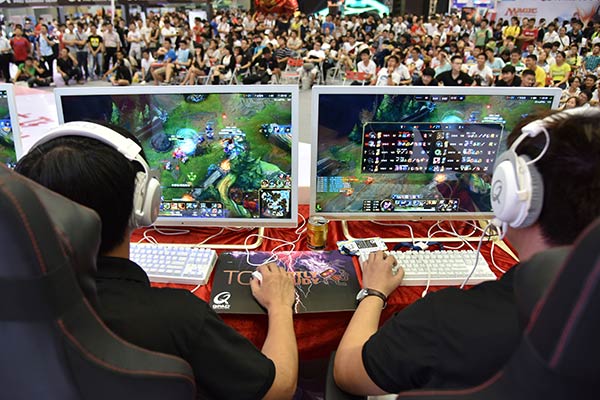 |
|
A video-game expo draws a big crowd of young fans in Shenzhen, Guangdong province, during the National Day holiday in October. [Photo/CFP] |
Chinese who grew up in the 1980s and '90s played with catapults or flew kites much like the previous generations. But today's young Chinese are into different games because of the Web.
Chinese Internet giant Tencent, UNESCO and the China National Academy of Arts have together launched a program to help people to recall their childhood memories online.
At a forum last week in Beijing, Tencent Interactive Entertainment announced that the program will gather, categorize and protect traditional games not just for Chinese but also for foreigner Web users.
The company, which is part of Tencent, will create a digital library for traditional games.
"The reason why many traditional games gradually fade away from the public domain is not because they lack in entertainment," Cheng Wu, the vice-president of Tencent, says, adding that it is due to the absence of measures in which such games can be made to reach young people who spend a lot of time on the Internet.
The project, he says, would "show the charm of traditional games to the new generations".
According to Davide Storti, an information official at UNESCO, the digital library will record how a particular game is played, when it was invented or when it was adopted by a given community, and discover how similar games have traveled around the world and united children and adults in different cultures.
"UNESCO has fostered and encouraged for a long time the debate on the role of traditional games and sports as a dimension of culture that is a component of modern humanism," Storti says.
"In every country, documentary heritage is both a record of life and history and also an irreplaceable source of creativity and inspiration. Traditional games are no exception."
Nie Zhiming, general manager for research and development at Tencent Interactive Entertainment Group, says the library will go beyond recording text and pictures. It would also serve as a database for developers of online games wishing to create new interactive games in the future.
The project will borrow some established models elsewhere for reference.
For example, NuVu Studio, a US-based institution that cooperates with Harvard University and MIT on students' innovation, has conducted a program combining traditional storytelling and games for mobile devices.
According to Saba Ghole, co-founder of NuVu, they have adapted parts of the Hindu mythology when expanding the program to India by developing a game with a boy who has time-traveled some 2,000 years ago. Guessing traditional riddles is also a crucial part of the game.
"When children play games, they also accept traditional culture," she says.
Though Tencent had developed the online game Journey to Fairyland mixing many traditional Chinese cultural elements back in 2008, the recent program will help expand such sources abroad.
For instance, Brave Adventure, an Internet game mixing traditional folklore of different countries, was launched by Tencent in June, but the digital library will add more traditional genres to it.
Tencent will not only adapt traditional games into interactive games, but also to a wider range like animation and literature, Cheng says, without giving a timeline for the launch.
Jia Leilei, deputy director of the China National Academy of Arts, says: "Traditional games preserve a nationality's folklore and collective wisdom as well as its unique values, but globalization can influence such cultural diversity.
"Technology can showcase tradition and let us live the games again."
|
|
|
|
|
|
|
|
